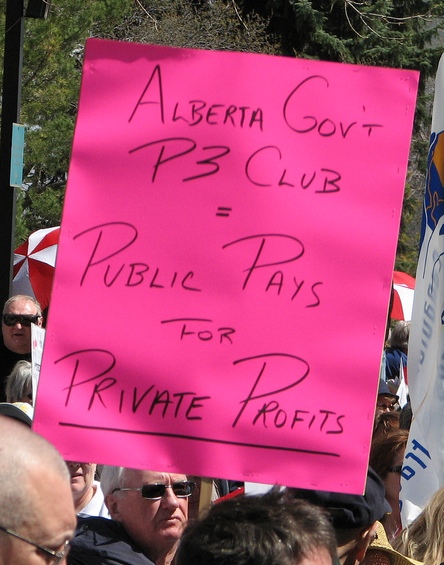
|
January 18, 2012 - No. 2 Alberta Soaring Electricity Prices Reveal How Alberta Is Being Restructured to Serve Private Interests  Alberta Alberta Soaring Electricity Prices Reveal How Alberta Is Being Restructured to Serve Private InterestsPeople in Alberta are facing soaring electricity bills
as consumers are forced to pay double the price of electricity of just
one
year ago. The price of electricity in 2012 is more than three
times higher than in 1999, just before deregulation took effect. The
Alberta Utilities Commission approved rate hikes of 46
per cent in January, permitting the
monopolies which generate electricity to charge residential consumers
and small businesses 15 cents per kilowatt hour even though the
wholesale price of electricity in the second week of January was 2.5
cents. The monopolies claim that the
soaring price of electricity is the result of the premature shutdown of
two coal-fired power units and an unexpected maintenance shutdown of a
new plant. When the Klein government deregulated electricity, it used the all-too familiar mantra of "choice" for power users. Utilities would be able to buy and sell electricity, with the price set by "market forces" -- i.e. by the dominant monopolies. The brutal nature of this choice has now become clear as people are forced to pay more and more for this essential service. Another significant aspect of the "deregulation" pay-the-rich scheme was that the total cost of transmission lines is now completely passed on to users, and the electrical generators are not required to pay one cent.
Before deregulation, Alberta's electrical energy was dominated by three utilities -- privately owned Transalta and Alberta Power (now ATCO) and Edmonton Power, owned by the City of Edmonton. Several other municipalities also had generation and/or distribution systems. Electricity is now supplied by seventeen companies. Five monopolies -- ATCO, Enmax, Capital Power Corporation, TransAlta and TransCanada Corp. -- supply about 80 per cent of the generating capacity. Deregulation opened up a market for the oil monopolies operating in the oilsands to build their own co-generation capacity. Cogeneration involves the simultaneous production of electrical power and heat using a single fuel source. Oilsands operations generate large quantities of steam both for mining and in situ operations. Surplus power can be sold to the grid. Co-generation capacity in the oilsands accounted for 40 per cent of Alberta's total generation capacity in 2006. With the pay-the-rich scheme of shifting the costs of building transmission lines to power users, export of power from co-generation becomes an extremely profitable venture for the monopolies. The dictate of these monopolies explains why the government has used its prerogative to ensure that the scheme to build what amounts to an eight-fold increase in existing transmission infrastructure with no public needs assessment goes forward. Under the terms of Bill 50, passed in 2009, the executive authority can approve transmission lines without any regulatory review simply by declaring them to be "critical" transmission lines. Land-use legislation upheld monopoly right over public right and the rights of farmers and other small land-owners so it would be full-steam ahead to build these utility corridors. Since the province began this restructuring in 1996,
6,600 megawatts of power have been added to the grid, representing an
investment of about $12 billion. Two high-voltage direct-current lines
between Edmonton and Calgary have been approved by cabinet. The cost of
these lines, now estimated to be at least $14.5
billion, will be completely borne by users and not by the monopolies
generating the electricity. This means that the working people are
being forced to pay for the transmission lines which will be used by
private interests to export energy to the U.S. The huge increase in capacity also makes no sense
whatsoever unless it is designed to export electricity to the U.S.
Cables released by
Wikileaks provide an insight into how new arrangements are being
made to guarantee cheap electricity to the U.S. In 2003,
Paul Cellucci, the U.S. Ambassador at the time, wrote "[Murray] Smith
[Minister of Energy] and others also want to make sure that the [United
States government] is aware that over time there will be tremendous
electricity co-generation available as a result of the huge thermal
needs of the oil sands refining process."
Cellucci added that "this could over time make significant new
electricity exports available to the United States..."[1]
In the face of widespread opposition to the building of lines which can only be intended to export power mainly from oilsands co-generation, the Redford government has begun hearings into whether all the approved transmission lines are required at this time. But the government has no intention of repealing Bill 50, which means that the outcome of the hearings is only for purposes of more effectively meeting private needs. At any time in the future, the government can declare any transmission lines as "critical infrastructure." Bill 50 signalled the further restructuring of the state
based on the logic that what is critical to Syncrude, Suncor, Canadian
Natural Resources, Shell, Total and so on is deemed to be "critical
infrastructure" which is therefore supposedly without question in the
public
interest. It is necessary to oppose this dictatorship where the state is put at the disposal of the most powerful monopolies and private interests. It is very harmful to the interests of the working class and people. Note1. "Wikileaks Shines Light on Alberta's $16-Billion Electricity Scandal," Andrew Nikiforuk, The Tyee, May 26, 2011.
Retrogressive Calls for a Provincial Sales Tax
Vocal proponents of an Alberta sales tax include Jack Mintz, head of the School of Public Policy at University of Calgary and former Chair of the C.D. Howe Institute; David Emerson, vice chairman of the Canadian Council of Chief Executives, member of the Alberta Premier's Council for Economic Strategy, and former federal Liberal and Conservative cabinet minister; and Doug Griffiths, Alberta Minister of Municipal Affairs and strong backer of Premier Redford. Mintz, Emerson, and Griffiths also present the argument that Alberta needs to institute some form of sales tax because the province can no longer depend on revenues from "resource royalties" to fund social programs. In a May 2011 report, the Parkland Institute, an Alberta research network situated within the Faculty of Arts at the University of Alberta, also called for an Alberta sales tax. What is being obscured is that in this era of the interconnected socialized economy, a sales tax and all other forms of individual taxation, are totally obsolete. It is another pay-the-rich scheme by which the monopolies attempt to claim more and more of the social product produced by the working class. In society, there are three main categories of claimants on the social product: the workers, who claim according to their work and work-time on what they produce and make available through distribution and the provision of services; the government, whose claims should be to finance social programs and meet its needs and the general interests of society, not those of the rich as is currently the case; and the owners of capital who claim their profit according to their private ownership and control of parts of the socialized economy. The lion's share of the social product, which is all produced by the working class, goes to the owners of capital. For example, in the last four quarters of 2010-11, just one company, Canadian Oil Sands Trust, which owns 37 per cent of oilsands giant Syncrude, had gross profits of $2 billion. Meanwhile, the Alberta government is budgeting for 2012 to collect only $8.3 billion in resource revenues (e.g., royalties) from the many, many companies that are making such profits exploiting Alberta's energy resources. Further, with the present obsolete system of individual taxation, workers make their just claim on what they produce but then are forced to hand over half or more of their claim to governments in the form of various taxes and fees for public services. Currently, $8.9 billion or 25 per cent of the $35.6 billion in revenues collected by the Alberta government comes from individual taxation and another 14.8 per cent ($5.3 billion) comes from "other taxes," "premiums, fees, and licenses," while a mere 10 per cent comes from corporate taxes, which are often "deferred." Individual taxation such as a sales tax strengthens monopoly power and control over the economy and weakens the struggle of individual workers and their collectives for a say and control because governments try to divert more and more government revenues away from health, education, and other required social programs, and into the hands of the owners of capital. Just one example of this kind of pay-the-rich scheme is the money diverted into Alberta's $2 billion fund for underground carbon dioxide storage which is all being handed over to Shell Oil, Transalta Utilities, and other energy monopolies. The current situation, where more and more of the social product produced by the workers ends up in the hands of the monopolies, turns many workers against taxation in general, which in turn weakens the movement for increased spending on social programs. The solution is that modern taxation must focus on the revenue of enterprises and not on individuals. Rather than turning against taxation in general, workers and their allies must fight for a modern definition of taxation. Workers must force government to abolish all individual taxation such as sales taxes, income taxes, individual property taxes, and user fees for public services. Instead, the government should be forced to make its claims objectively and directly from the monopolies, that is, from the revenue of enterprises at the point of production and distribution of goods and provision of services.
Government Agenda for School Construction --
|
 More than 200 faculty and students participate in forum to question the cuts to the U of A Faculty of Arts, November 23, 2011. (Gateway) |
Over the past three years the Faculty of Arts has lost a total of $6.13 million. In 2009-10 the Faculty took a two per cent cut. In 2010-11 the Faculty took a five per cent cut and lost a large portion of the Enrolment Planning Envelope (EPE) monies from the Province of Alberta. A cut of approximately 2 per cent for the 2012-13 year is anticipated. The cuts have already had many negative effects. The non-salary base budget for each arts department has been reduced and departments also had to give up 40 per cent of their year-end positive budget variance to the Faculty. Departments were forced to decrease spending on research initiatives, sessional (contract) instruction, and office expenses. Six workers were laid off, based on the obsolescent capital-centred notion that workers are a cost of production, rather than the producers of all goods and services. Instead of demanding that the province increase funding to post-secondary education, the response of the Office of the Dean of Arts to the most recent budget cut was to initiate the top-down Administrative Process Review Project (AdPRep) process. The predetermined agenda of AdPRep, set without any consultation with staff, students, or faculty, is that cuts must be made. An external consultant with no educational background was hired for $70,000 through a non-competitive process to determine where to carry out the dirty work. Fake "scientific" methods, such as asking staff to list every function they perform, an impossible task, are being used to give the process "credibility."
Despite being assured that no actual decisions have been made, staff, students, and faculty have been informed that up to 15 administrative positions will be cut. This is 10 per cent of the total administrative staff, who are responsible for the day-to-day management of the department's teaching and research and who perform the work that is the foundation of each department's community. Other positions will likely be centralized. Graduate funding may be cut or even whole departments eliminated. The Dean's Office is now "visiting" each arts department to try to sell the "necessity" of the cuts and to make anti-people suggestions such as that staff should take "early retirement."
In response to the latest announcements, the Faculty of Arts Staff Solidarity coalition (FASS), a coalition of staff, students, and faculty, has launched a campus-wide campaign to challenge the cuts agenda. FASS is demanding that genuine consultation take place with staff, students, and faculty, without a predetermined agenda. FASS is also demanding that the university call on the provincial government to increase educational funding and not cave in by shifting the burden of the provincial cuts onto the backs of the university community. As a result of a recent FASS petition, the Dean of Arts had to hold a public forum in November where participants discussed and questioned the process and the cuts. Under continued pressure, the Dean's Office is holding another forum Wednesday, January 18 at 10:30 am. However, participants will be limited to asking questions and the meeting is set for a time when the majority of staff, students, and faculty are otherwise occupied. Meanwhile, the FASS campaign is continuing on a number of fronts.
Impose a moratorium on all funding cuts to education!
Canadian Wheat Board
Western Grain Farmers Fight Destruction of
Wheat Board
Through the Courts


A class-action lawsuit was launched in Saskatoon on January 9 seeking $15.4 billion in damages resulting from changes made by the Conservative government to the Canadian Wheat Board, CBC News reported.
"Plaintiff Duane Filson, a farmer, teacher and municipal politician from Woodrow, Saskatchewan, represents a class that could include any Prairie grain farmer with sales of wheat or barley to the Canadian Wheat Board in 2011 or 2012," said the CBC report.
Merchant Law Group LLP launched the suit on the farmers' behalf, the report says. Before the class action can proceed, the claims must be proven in court and certified by a judge. "The first court date to consider the certification of the class is expected in about two months," the CBC wrote.
"This lawsuit is not about the single desk [monopoly marketing system]," said lawyer Tony Merchant. "If you're going to make changes, you have to compensate," he said, adding that when the federal government ended the Crow Rate subsidy for shipping grain by rail, farmers were compensated.
 Rally in support of single-desk marketing,
in front of the Wheat Board's
Winnipeg offices, October 28, 2010. (FCWB) |
Documents filed in court say that farmers should be compensated for losing all of the Wheat Board's assets at the time the government's changes took effect. These assets include $100 million in cash, over 3,000 rail cars, the prepaid purchase value of lake freighters for shipping grain by sea, an office building in Winnipeg and other intangible assets, as valued by experts for the purpose of the lawsuit. Part of the claim includes damages for lost price premiums previously obtained with the selling power of the board's monopoly.
"A corporate dissolution requires surplus funds, proceeds and assets to be returned to appropriate creditors and stakeholders," the lawsuit argues. "The dissolution of the [farmer-controlled wheat board] requires the return of all funds, proceeds and assets accumulated back to the class, the rightful owners of the CWB value."
The lawsuit deems the legislation as having "unlawfully repurposed" tangible and intangible assets of farmers, causing $15.4 billion in estimated damages and removing all the value and benefits derived from the previous marketing system, the CBC reports.
Further, it argues that the government has "wrongfully and intentionally interfered with the business relations" between the plaintiff, the wheat board and the former farmer-elected directors. The lawsuit claims a "breach of implied trust" to maintain the wheat board's assets to the benefit of the farmers it served, and claims that the new voluntary wheat board controlled by the government has been "unjustly enriched" by the changes.
Speaking to the farmers' loss of the CWB's single-desk marketing of wheat and barley in relation to the loss of the Board's assets, Merchant pointed out, "How can a voluntary wheat board function? What can they offer? Economists say it isn't going to work and those assets will be dissipated. Farmers say give me my share right now. I don't want to go into that new gamble."
Friends of CWB and CWB Alliance Plan Further Legal Action
In a January 11 press release, the Friends of the Canadian Wheat Board (FCWB) also announced that in consultation with the Canadian Wheat Board Alliance (CWBA) and other interested parties, they are fully prepared to broaden their current legal challenge to Bill C-18. The FCWB can and will file a class action lawsuit on behalf of participating prairie grain producers on short notice at the appropriate time, said the release.
Grandview, Manitoba area farmer Larry Bohdanovich said that "it is clear that the Harper Government is pursuing a policy of confiscation without either consultation or compensation. This is totally unacceptable and prairie farmers will not take this lying down."
 "One of our legal avenues
is to launch a class action
lawsuit on behalf of prairie farmers to recover the value which will be
lost should Minister Ritz succeed in ending the single desk," said
Zenon Park Saskatchewan grain producer Gilbert Ferre who is the acting
Chair of the Canadian Wheat Board Alliance.
"Our legal counsel is prepared to file a submission in court within
days if necessary."
"One of our legal avenues
is to launch a class action
lawsuit on behalf of prairie farmers to recover the value which will be
lost should Minister Ritz succeed in ending the single desk," said
Zenon Park Saskatchewan grain producer Gilbert Ferre who is the acting
Chair of the Canadian Wheat Board Alliance.
"Our legal counsel is prepared to file a submission in court within
days if necessary."
"We continue to hope that the courts will uphold Justice Campbell's [December 7] ruling that Ritz' Bill C-18 legislation is 'an affront to the rule of law' and that the need to sue for compensation will be unnecessary," said Stewart Wells, an organic grain producer at Swift Current, Saskatchewan and one of the eight recently dismissed farmer-elected directors of the Wheat Board. "But if the worst happens, farmers will demand full compensation from the Federal Government for the consequences of its undemocratic actions."
Wells went on to say, "We believe farmers' interests would be best served by a broader legal challenge mounted by the Friends of the CWB, the CWB Alliance, and other membership-based organizations because they represent a wider range and a greater depth of experience and knowledge on Wheat Board issues. Over the last several months, these cooperating groups have been conducting research to gather and document evidence to support a comprehensive claim for compensation."
"Farmers must receive appropriate compensation should Ottawa succeed in ignoring the wishes of the majority of farmers who have consistently voted to retain the single-desk marketing advantage," said Laurence Nicholson, an irrigation farmer at Seven Persons, Alberta. "Our claim will be developed in the western farm tradition of cooperation and service-at-cost so that the true costs of destroying our Wheat Board will be borne by the people responsible in Ottawa."
Anders Bruun, Legal Counsel for the Friends of the CWB, said that "the legal route seems to be the only way for prairie farmers to get the attention of the ideologically-driven Harper Government." He expressed confidence that the rule of law would ultimately prevail.
Request for Injunction Against Bill C-18
The hearing in the Manitoba Court before a Queen's bench judge for an injunction against the implementation of Bill C-18, proceeded on January 17 and continues January 18. Former Wheat Board chairman Allen Oberg spoke to the media outside the court. The former directors are asking for the law to be suspended until a court rules on the validity of the legislation, he said. They argue the law is invalid in part because the government did not hold a vote among farmers.
"We're asking that this injunction be granted so that the whole industry can step back and make the determination as quickly as possible," Mr. Oberg said. He and the other directors are paying the legal costs of the lawsuits with financial help from other farmers, he said. He confirmed that even if they lose the current round of legal action they plan to keep fighting in court.
(Friends of the CWB, CWB Alliance, Portage Online, CBC News, Globe and Mail)
Clear Gain for Private Monopoly Interests


As of December 15, the Canadian Wheat Board is no longer run by farmers. The eight farmer-elected directors were fired when the Harper government's Bill C-18 to destroy the single-desk marketing board received Royal Assent, leaving the five government appointed directors in charge.
The board continues to operate for the 2012 crop year and beyond as a voluntary seller for Prairie grain farmers, the new Board announced on January 13. According to the new law, after a five-year transition period, the government appointed directors will determine if the wheat board can continue to operate as a viable voluntary organization in an open market. If it cannot, it could be dissolved by the government altogether.
According to CWB media relations manager Maureen Fitzhenry, when the Board loses its single-desk come August, its "new role" will include offering farmers marketing advice, short- and longer-term pools for grain and cash contracts, in which farmers choose when they price and sell their crops.
"The CWB states that the shorter-term pool will create early delivery opportunities for farmers, while the longer-term pool will call deliveries throughout the pooling period. Payments would take the form of initial payments, followed by adjustment and final payments; early payment options will also be available," the Alberta Farmer Express reports.
The Board is presenting the destruction of the single-desk marketing board as advantageous to farmers saying that with the cash contracts, farmers choose when they price and sell and receive full payment soon after delivery, and that the Board plans to help farmers hedge their price risk on futures markets.
Notably absent from the CWB's announcements is any assistance to farmers in terms of the shipping of grains from farms to the terminals, one of the essential aspects of the Wheat Board's work before its takeover by the Harper government.
The new Board confirmed on January 16 that 23 people have been laid off from the Winnipeg head office this week and further layoffs could be coming. The Wheat Board employs about 400 people in Winnipeg.
Meanwhile, one of agri-business' biggest players, Viterra, called Canada's biggest grain handler, has set out predictions for its gains from the closing of the Canadian Wheat Board's single marketing desk, Alberta Farmer Express reports.
"In a guidance statement ahead of the release of its fourth-quarter and year-end financial data next week, Viterra said it expects its earnings before interest, taxes, depreciation and amortization (EBITDA) to rise by between $40 million and $50 million per year in fiscal 2014 and beyond as a result of the end of the single desk," states the report. It continues:
"With forward-contracting of Prairie wheat, durum and barley already underway for direct deliveries pending formal deregulation on Aug. 1, Calgary-based Viterra said [January 11] it expects to begin 'realizing modest benefits' in its fourth quarter of 2012, with 'more significant impacts' in fiscal 2013.
 "Following the passage of
the federal government's Bill
C-18 last month, Viterra became the first grain company to offer bids
to buy wheat, barley and durum directly from Prairie growers.
"Following the passage of
the federal government's Bill
C-18 last month, Viterra became the first grain company to offer bids
to buy wheat, barley and durum directly from Prairie growers.
"'Additional volumes' at the company's primary grain elevators and port terminals are expected to generate higher revenue from its fixed-cost facilities, and to earn 'additional merchandising margins,' the company said.
"Its additional grain purchases from farmers as a result of open wheat, durum and barley marketing is expected to require $150 million to $200 million of 'incremental working capital,' Viterra said.
"Given its existing assets, staff and global marketing network, Viterra said it 'does not expect to incur any additional growth capital expenditures' to achieve the expected earnings benefit.
"'With the ability to purchase all grades of wheat, barley and durum directly from growers, the company expects to increase its earnings by attracting additional volumes and optimizing its operational efficiencies,' Viterra said.
"'With the new marketing freedom in Canada, Viterra's international network will benefit growers as it provides them access to additional global markets,' company CEO Mayo Schmidt said in a release.
"'Despite a legal challenge from opponents of the legislation, Viterra remains confident that there will not be any delays' to Bill C-18's full implementation, the company said.
"Viterra has scheduled its fourth-quarter and year-end conference call for late Wednesday afternoon (Jan. 18)."
(Alberta Farmer Express, CBC News, Globe and Mail)
Read The Marxist-Leninist
Daily
Website: www.cpcml.ca
Email: editor@cpcml.ca

 In a 2010 report, the Oil
Sands Developer's Group stated
that the passage of Bill 50 "provided greater certainty" that new 500
kV lines would be built from Edmonton to Fort McMurray. It further
stated that passage of the bill "could potentially reverse the trend to
build capacity to meet on-site demand only and
support the growth in net exports from co-generation by encouraging
developers to install greater capacity."
In a 2010 report, the Oil
Sands Developer's Group stated
that the passage of Bill 50 "provided greater certainty" that new 500
kV lines would be built from Edmonton to Fort McMurray. It further
stated that passage of the bill "could potentially reverse the trend to
build capacity to meet on-site demand only and
support the growth in net exports from co-generation by encouraging
developers to install greater capacity."
 Recently, various political
representatives of the
monopolies in Alberta have been testing the waters by floating the idea
of instituting an Alberta sales tax. On November 17, Alberta Finance
Minister Ron Liepert claimed that during recent roundtable
"consultations" with Albertans, many unidentified people supposedly
suggested that a provincial sales tax would help balance Alberta's
books in the face of "falling resource revenues." In other words, more
added-value should be collected from the workers and less from the
monopolies. In the time-honoured manner of "the jury will disregard
that remark," the following day Liepert
"withdrew" his comments and new Premier Allison Redford stated that
Alberta would never have a provincial sales tax. Liepert did, however,
state that the conversation surrounding the province's tax structure
will have to happen "sooner than later." By this he meant that "sooner
than later" more ways must be found
to pay the rich through the provincial taxation system.
Recently, various political
representatives of the
monopolies in Alberta have been testing the waters by floating the idea
of instituting an Alberta sales tax. On November 17, Alberta Finance
Minister Ron Liepert claimed that during recent roundtable
"consultations" with Albertans, many unidentified people supposedly
suggested that a provincial sales tax would help balance Alberta's
books in the face of "falling resource revenues." In other words, more
added-value should be collected from the workers and less from the
monopolies. In the time-honoured manner of "the jury will disregard
that remark," the following day Liepert
"withdrew" his comments and new Premier Allison Redford stated that
Alberta would never have a provincial sales tax. Liepert did, however,
state that the conversation surrounding the province's tax structure
will have to happen "sooner than later." By this he meant that "sooner
than later" more ways must be found
to pay the rich through the provincial taxation system. Through years of
underfunding to school boards, the
government has created a crisis where schools are in dire need of
maintenance and renewal. The Calgary Board of Education, for example,
estimates its deferred maintenance bill at over $800 million. As
schools built in the population boom of the 1960s mature,
the situation is expected to become even more serious. Alberta Minister
of Education Thomas Lukaszuk's proposed solution, pending government
approval, is to give up on maintenance and instead build new schools.
Through years of
underfunding to school boards, the
government has created a crisis where schools are in dire need of
maintenance and renewal. The Calgary Board of Education, for example,
estimates its deferred maintenance bill at over $800 million. As
schools built in the population boom of the 1960s mature,
the situation is expected to become even more serious. Alberta Minister
of Education Thomas Lukaszuk's proposed solution, pending government
approval, is to give up on maintenance and instead build new schools. In the 2011-2012 fiscal
year, the Alberta government's
forecasted revenue, from taxation and other sources, was $35.6 billion.
The government also has a Heritage Savings Trust Fund valued at $14.7
billion. It would have no difficulty building schools if it stopped
handing over billions to the rich and instead
invested in education, health care and other social programs.
In the 2011-2012 fiscal
year, the Alberta government's
forecasted revenue, from taxation and other sources, was $35.6 billion.
The government also has a Heritage Savings Trust Fund valued at $14.7
billion. It would have no difficulty building schools if it stopped
handing over billions to the rich and instead
invested in education, health care and other social programs.